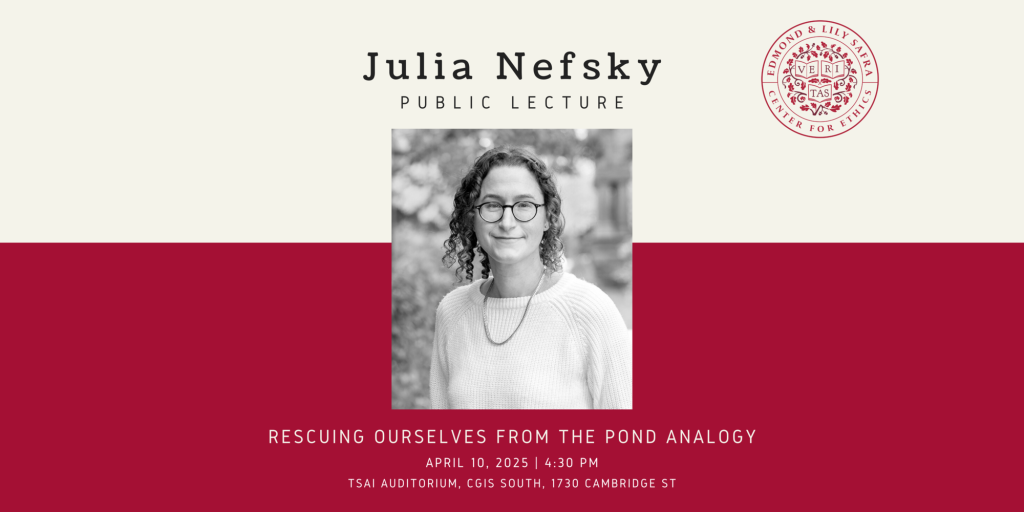
The Edmond & Lily Safra Center for Ethics welcomes Julia Nefsky for a public lecture titled “Rescuing Ourselves from the Pond Analogy.”
The lecture is open to all. Registration is required for in-person attendance. Register here.
This event is also available via livestream.
About the lecture:
“We live in a world in which many people are suffering. How should this affect the way we live our lives?”
This talk presents a paper that Professor Julia Nefsky is writing jointly with Sergio Tenenbaum, as part of a broader project that they are working on together. We live in a world in which many people are suffering in poverty, lacking adequate food, clean water, medical care, or basic safety and security. How should this affect the way we live our lives? Peter Singer argues that not only should we donate a large amount of our money to help those in need, but also that more or less any time we spend money on seemingly ordinary pleasures for ourselves, we are acting wrongly. We ought to donate that money instead. In arguing for this, Singer famously draws an analogy between spending money on pleasures for oneself and choosing not to save a child drowning in a shallow pond because you don’t want to ruin your nice clothes. These two choices are, he suggests, morally the same. There have been many attempts to reply to Singer, and some make potentially important points. But Nefsky and Tenenbaum argue that these replies do not actually work as responses to Singer and his strong conclusions. Specifically, they argue that rather than explaining where the pond analogy goes wrong, these replies each require, for their own ideas to work, presupposing that the analogy is mistaken. This reveals that responding to the analogy is a different and more fundamental task than people have understood. We cannot get out of the analogy and its strong implications – as many seem to think – by developing a different conception of morality than Singer’s. Instead, the development of a plausible conception of morality depends on being able to break the analogy in another way. In the final part of the paper, Nefsky and Tenenbaum discuss what they think is the right way to break the analogy. They then suggest that a broader version of their account underwrites, much more generally, the difference between perfect and imperfect duties.
About Julia Nefsky:
Julia Nefsky is an Associate Professor at the University of Toronto, and the Chair of the University of Toronto Scarborough Philosophy Department. She works in moral philosophy. Her articles include, “How You Can Help, Without Making a Difference” (Philosophical Studies), “Consequentialism and the Problem of Collective Harm” (Philosophy and Public Affairs), “Climate Change and Individual Obligations” (Philosophy and Climate Change, Oxford University Press), and “Misery Loves Company” (Oxford Studies in Normative Ethics).

